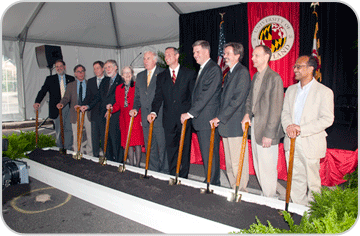- Details
-
Published: Wednesday, September 15 2010 13:15
Condensed Matter Theory Lecture Set for Oct. 19 at UMD
Nobel laureate Walter Kohn, who invented the density-functional theory of matter, has been named the 2010 recipient of the Richard E. Prange Prize and Lectureship in Condensed Matter Theory and Related Areas. Kohn will deliver a public presentation at the University of Maryland, College Park, on Oct. 19, 2010. Kohn’s work on the density-functional theory has had transformative impact on physics, chemistry, engineering, and medicine.
The award, established by the UMD Department of Physics and Condensed Matter Theory Center (CMTC), honors the late Professor Richard Prange, whose distinguished career at Maryland spanned four decades (1961-2000). The Prange Prize is made possible by a gift from Dr. Prange's wife, Dr. Madeleine Joullié of the University of Pennsylvania.
After receiving a Ph.D. in theoretical physics from Harvard University, Kohn embarked on a career that included work at Bell Telephone Laboratories with William Shockley, whose group invented the transistor. In 1979 Kohn was appointed founding director of the National Science Foundation’s Institute of Theoretical Physics at the University of California in Santa Barbara. He has received the United States National Medal of Science, the UNESCO/ Niels Bohr Gold Medal and, for his role in creating the most widely used theory of the electronic structure of matter, the 1998 Nobel Prize in chemistry. His documentary on solar power, “The Power of the Sun”, has received world-wide distribution in 10 languages. He is currently Professor of Physics, Emeritus and Research Professor at UCSB.
Kohn’s Prange lecture, titled “A World Powered Predominantly by Solar and Wind Energy," will be delivered at the University of Maryland's John S. Toll Physics Building at 4:00 p.m. EDT on Tuesday, Oct. 19 in the Physics Lecture Hall, Room 1412. The event is open to the public.
Dr. Richard Prange did his graduate studies at the University of Chicago, where he worked with Nobelist Yoichiro Nambu, among others. Prange was the editor of a widely known book on the quantum Hall effect, but his interests reached well beyond condensed matter, extending into every substantive aspect of theoretical physics including seminal work on quantum chaos. He was at complete ease discussing subjects as disparate as ferromagnetism and the cosmological constant. His interests also included history and travel.
At the University of Maryland, he played a vital role in the life of the Physics Department, leading a substantial reform of its undergraduate major program and serving as chair of crucial departmental committees.
"Richard enjoyed a fascinating and fulfilling career at the University of Maryland exploring condensed matter physics, and even after retirement was active in the department," said Dr. Joullié. "He spent the very last afternoon of his life in the lecture hall for a colloquium on graphene, followed by a vigorous discussion. And so I was happy to institute the Prange Prize, to generate its own robust discussions in condensed matter theory. Walter Kohn is an ideal recipient."
Dr. Prange was a member of the Maryland condensed matter theory group for more than 40 years and was an affiliate of CMTC since its inception in 2002.
"The Prange Prize provides a unique opportunity to acknowledge transformative work in condensed-matter theory, a field that has proven to be an inexhaustible source of insights and discoveries in both fundamental and applied physics," said Dr. Sankar Das Sarma, who holds the Richard E. Prange Chair in Physics at UMD and is also a Distinguished University Professor and Director of the CMTC.
The prize was inaugurated in 2009, with a lecture by Nobel Laureate Philip W. Anderson.
More Information
###
Directions to the College Park campus are available at: http://www.cvs.umd.edu/visitors/maps.html
To locate the Physics Building, see the campus map at: http://www.cvs.umd.edu/downloads/campus%20map%20012309.pdf
University of Maryland Physics: http://umdphysics.umd.edu/
College of Computer, Mathematical and Physical Sciences: http://www.cmps.umd.edu/
Condensed Matter Theory Center: http://www.physics.umd.edu/cmtc/

